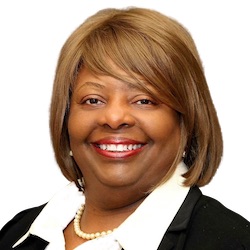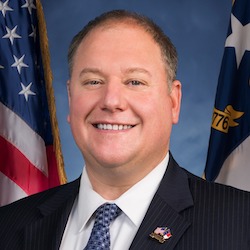The State Slate: Round 3
In 2020, we're fundraising for state house races in states and districts where Democrats are within reach of a majority in the state legislature.
We fundraise directly for individual campaigns, with no administrative overhead—every dollar you give goes to the candidates.
In round one of the State Slate, we raised $258K for 11 great candidates in Florida, Pennsylvania, and North Carolina.
In round two of the State Slate we raised $288K for a further 13 candidates in Iowa and Arizona, two of the most closely contested state legislatures in the country.
In this third round of fundraising, we're going back to Florida and North Carolina to back eleven more candidates in close races. At stake is Medicaid expansion, which will bring better health care to hundreds of thousands of uninsured, and redistricting, which affects us all by defining how Congressional districts are drawn after the 2020 census.
Both states are also Presidential battleground states, and North Carolina has a competitive Senate race. I've written about the situation in each state in more detail below.
But first, let's meet our candidates!
Virginia Cox Daugherty, NC

An eastern North Carolina native whose parents were sharecroppers, Daugherty spent thirty years in public service as a teacher and school administrator. She holds a doctorate in education from Nova Southeastern University and a doctorate in Biblical Studies from Manna College of Theology. Dr. Daugherty is running for office after serving a term on the Lenoir County Board of Elections. While her district voted narrowly for the Republican incumbent in 2018, registered voters who did not vote trend Democratic by almost 20 points.
District: HD-12, Kinston, south of Greenville.
Incumbent: Chris Humphrey, elected 2018.
Adam Ericson, NC

Ericson is a coach and a public school teacher at New Hanover High School, who was motivated to run for public office by years of funding cuts to North Carolina public education. He's running on a platform of Medicaid expansion, restoring pre-2011 levels of school funding, and securing a safe water supply for every North Carolinian. This is another district where registered voters who did not vote in 2018 lean heavily Democratic—an election where identifying those voters and getting them to mail in their ballots will be key.
District: HD-20: Wilmington
Incumbent: Ted Davis, Jr.
Annette Collazo, FL

A first-generation Cuban-American, Collazo is a public school teacher with experience in special education, as well as the founder of ¿Qué Pasa, Hialeah? (QPH), a civic engagement group in her district. She's currently pursuing her Master's degree in education at Florida International University. Collazo, a late entrant to the race, is running to replace a term-limited Republican incumbent and had just $11,000 left in her campaign account as of July 20.
District: HD-110: Miami area.
Incumbent: This is an open seat.
Maureen Porras, FL

Born in Nicaragua, Porras came to Miami at the age of seven. She serves the large Nicaraguan-American community in her district, as well as other Floridians from all over the world, as an immigration attorney with Church World Service in Doral, where she is Director of Legal Services. The last Democrat to run in this district lost by only 421 votes, and was outspent by a ratio of 20:1.
District: HD-105: A huge chunk of the Everglades with pieces of Naples and Miami.
Incumbent: Open seat.
Brian Farkas, NC

Farkas (who works in a local architecture firm) has a level experience in the public and private sectors that belies his relative youth. He is running to expand Medicaid funding to North Carolina, ensure fair redistricting, and re-fund North Carolina public schools. Farkas's opponent, Perrin Jones, inherited this seat after the incumbent was appointed to a vacant seat in the U.S. Congress. Court-mandated redistricting has moved this district significantly to the left since Democrats lost it by 2 points in 2018.
District: HD-9: East of Greenville.
Incumbent: Perrin Jones
Clint Barras, FL

Barras is a first-time candidate running to replace a term-limited Republican incumbent. He works as a digital marketing executive who has also served on the Florida Keys National Marine Sanctuary Advisory Council. His top campaign issues include water pollution, which has a serious impact on coral reefs in the Florida Keys, Medicaid expansion, and improving public education in Florida, which ranks 46th in the country in teacher pay.
District: HD-120: Southern tip of Florida, into Key West.
Incumbent: open seat.
Emily Nicholson, NC

Nicholson is a former high school and community college teacher who now works as a workforce development professional in her rural district. As a working mother of three school-age kids, she is determined to see the concerns and challenges of North Carolina working parents better represented in the state legislature. Her platform focuses on education and health care. The Democratic challenger lost this seat by a margin of 1,720 votes in 2018. The "untapped" voters in this district—registered voters who did not vote in 2018—lean Democratic by almost 30%.
District: HD-1: Northeast NC near the Great Dismal Swamp.
Incumbent: Ed Goodwin, elected in 2018.
Frances Vinell Jackson, NC

Jackson holds a doctorate in Public Policy from Walden University and has a long career of public service, including 11 years in the Cumberland County planning department, a position as zoning administrator and Transportation Director in Hoke County, and Cumberland County Magistrate. Dr. Jackson has also taught civics and economics at Hoke County High School. A devout Christian, she is an active member of Kingdom Impact Global Ministries. This will be the first election under a new house map that gives her district a slight Democratic lean.
District: HD-45: southwest of Fayetteville.
Incumbent: John Szoka, first elected in 2012.
Jason Cain, NC

Cain fell in love with North Carolina during his decade of service in the 82nd Airborne at Fort Bragg, a military career that included five combat tours to both Iraq and Afghanistan. Concerened about the impact of the opioid crisis in his adopted state, Cain co-founded the Stop the Addiction Fatality Epidemic (S.A.F.E. Project). He also earned dual masters' degrees from George Washington University and Harvard on the G.I. Bill. His is another district where there is a large latent Democratic vote among rural black registered voters who did not vote in 2018.
District: HD-51: Southwest of Raleigh.
Incumbent: John Sauls, elected in 2016.
Nicole Quick, NC

Quick has a master's degree in economics, and worked in forecasting and budgeting for Guilford Mills and Brayton International in North Carolina before leaving to start a family. After her son was diagnosed with autism, she retrained as an educator and occupational therapist, helping improve the school experience for other autistic children. Her district is another state house district that has been redrawn considerably more Democratic leaning, and where our chances of victory hinge on turnout.
District: HD-59: Greensboro.
Incumbent: Jon Hardister, elected in 2012.
Jim Bonfiglio, FL

The former mayor of Ocean Ridge, Bonfiglio is in a rematch with his 2018 opponent after losing this Palm Beach district by just 32 votes, a result that went to a recount and got this race national attenion. Bonfiglio's district is one of only six in the entire state that moved from Romney to Clinton. As of July, Bonfiglio is at a 3:1 fundraising disadvantage against his well-heeled Republican opponent despite being in one of the most competitive races in the state.
District: FL-89: The coastal strip north of Pompano Beach.
Incumbent: Mike Caruso.
Give right now to the State Slate!
Here's the situation in each state:
North Carolina
Republicans control both houses of the North Carolina state legislature by small majorities. Democrats need to win six seats to capture the state house, and five seats to control the state senate.
Republicans have made aggressive use of redistricting to try to establish a permanent structural majority in the state. Redistricting is the province of the state legislature, and district maps for the next 10 years will be drawn up in 2021 once the Census results are official.
Republicans have also resisted Medicaid expansion, essentially turning down free Federal money for expanded health care for poor people on ideological grounds. Reversing this policy would mean an immediate improvement in the lives of half a million North Carolinians.
North Carolina has a competitive Senate race, with several recent polls showing Democratic challenger Cal Cunningham leading incumbent Thom Tillis. State house races have a direct bearing on turnout, especially when so many will vote by mail, and helping them is an excellent way to help both Cunningham and the Biden/Harris ticket carry North Carolina.
Florida
Republicans have a trifecta in Florida—they control the state house, senate, and governorship. Democrats need to win 14 seats to capture the state house, a goal that demographic changes in this large state have brought within reach in 2020.
Like North Carolina, the Republican majority in Florida has rejected Medicaid expansion that would bring better health care to hundreds of thousands of Floridians. A Democratic state house would also prevent Republicans from gerrymandering Congressional districts in one of our most populous states after the 2020 Census.
Florida is expected to gain two Congressional seats in the 2020 reapportionment, so how district boundaries are drawn here will have an outsized impact on national elections for at least a decade to come.
Florida is one of a small number of states that disenfranchises convicted felons who have completed their sentences but not paid all outstanding fines court fees, effectively denying the vote to hundreds of thousands of citizens who cannot come up with a ransom for their vote that often reaches tens of thousands of dollars.
Finally, Florida is a competitive state in the 2020 presidential race. Helping state house candidates get out the vote is an effective way to target turnout in a year when most voting will be done by mail, over the course of several weeks.
You better donate to that State Slate!
Campaign finance rules are a little different for state races than they are nationally.
For Florida races, individuals can donate up to $1,000 per candidate.
In North Carolina the contribution limit is $5,400.
You must be a US citizen, or green card holder, to donate.
You've read enough! These are winnable races, we have an excellent pool of candidates, and all that's missing is the budget to maximize voter turnout and outreach in the few weeks remaining before the November election.
In a political year when campaign spending will break all records, this is a place where even small donations will go very, very far.
